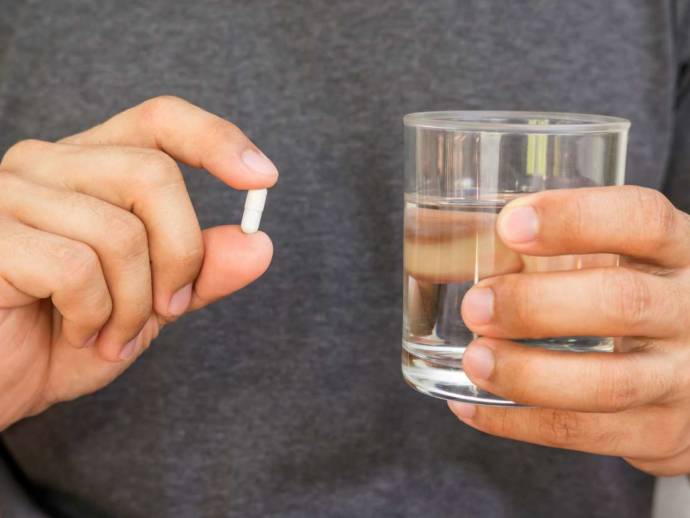Biotin is a micronutrient which is required to convert the food into energy. It also helps in the metabolism of fats, proteins, and carbohydrates. Various symptoms occur due to biotin deficiency such as conjunctivitis, hair thinning and redness around the body openings. Biotin deficiency is rare as biotin is synthesized in the body in the amount greater than required by the body. People think that biotin supplementation can manage the symptoms of hair loss and psoriasis. This hypothesis is supported by the clinical trials only in those patients with established biotin deficiency. There is no conclusive evidence to show that biotin helps in managing psoriatic symptoms in patients with normal biotin levels.
Biotin
Biotin is also known as Vitamin H or B7. This vitamin is the member of Vitamin B-complex family. Biotin plays a vital role in body metabolism. This vitamin mediates a variety of chemical reactions relating to the metabolism of fatty acids, amino acids, and glucose.
This vitamin acts as a coenzyme in various metabolic processes including gluconeogenesis and fatty acid synthesis. It is to be noted that the deficiency of biotin in the normal healthy individual is rare. This is because of the fact that biotin is synthesized in the body through intestinal flora. The quantity of biotin synthesized by these floras are more than the biotin required by the body and the excess biotin gets stored in the liver.
The deficiency of biotin in the body is caused due to the absence of enzymes which are required for absorbing and using biotin. These enzymes include holocarboxylase synthetase and biotinidase.
Biotin is available as a health supplement in a variety of segments. It is available in combination with various vitamins and minerals for general health while some formulations of biotin are specifically marketed for hair and nail health and also as pregnancy supplement as biotin is said to be helpful in fetal development. Some formulations containing biotin are also available for topical use.
Psoriasis
Psoriasis is a chronic inflammatory condition. This condition is caused due to an abnormality in the immune system. This disease comes under the umbrella of auto-immune disease. The immune system of the patient becomes overactive and damages the body’s own healthy cells. The symptoms associated with psoriasis include inflammation, white or silver patches on the skin along with flaking. The patient also experiences pain and itching in severe conditions. Psoriasis is a chronic condition, but the symptoms are not always present. The symptoms may come and go.
The people with dark skin color has purple patches. The condition may be localized or generalized. This means that the patches of dry, red and inflamed skin may be present either on a particular area or it may be present on the whole body.
As the condition is due to the overactive immune system, the condition is not contagious. Psoriasis is said to a be a genetic disease and symptoms are triggered due to environmental factors.
There is no cure for this disease and the disease can be managed with the help of medications such as corticosteroids, immunosuppressants, and vitamin D3 creams. People usually present symptoms at adulthood and this disease increases the risk of developing other diseases such as lymphoma, psoriatic arthritis, and cardiovascular complications.
Biotin in Psoriasis
Although biotin is essential for maintaining the healthy metabolic system of the body and also helps in maintaining the health of hair, nails, and skin, the deficiency of this vitamin is rare. Various studies have conducted for the efficacy of this vitamin in psoriasis but none of them shows conclusive evidence in patients which are normally healthy apart from psoriatic symptoms. Cases of the patients with concomitant psoriatic symptoms such as dermatitis and biotin deficiency are able to manage dermatitis with biotin supplementation. But these are only the cases and does not follow the guidelines of the clinical trial.
The symptoms of biotin deficiency include rashes, poor hair growth, and increased hair loss, thus it can be a theoretical approach to manage the symptoms of psoriasis and increase hair growth by biotin supplementation. However, the actual clinical trial indicates otherwise. Biotin supplementation is effective in patients with biotin-responsive psoriatic symptoms. These are the patients who are suffering from either the acquired or congenital biotin deficiency.
In a case study of 1985, three infants with biotin deficiency have improved symptoms of rashes and dermatitis with biotin supplementation. Studies do not show a direct link between the management of psoriatic symptoms due to biotin supplementation in otherwise healthy individuals.
Thus, the patient should be evaluated on a case-to-case basis for the management of psoriatic symptoms such as rashes and dermatitis as biotin is effective in the patient with either acquired or congenital biotin deficiency disorders.
Conclusion
According to the clinical trials, psoriatic patients with normal biotin levels does not get any benefit from biotin supplementation in the reduction of psoriatic symptoms. People with low biotin levels, which is a rare phenomenon, have their symptoms managed due to biotin supplementation. Thus, the physician should evaluate the condition of the patient and prescribe them biotin only if they are suffering from biotin deficiency. Supplementation of biotin in psoriasis is more of a marketing approach which is not backed up by any conclusive scientific evidence.





